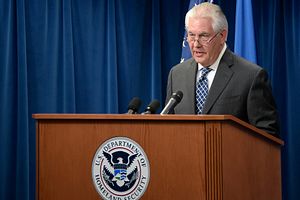On December 12, at a Washington D.C.-based think tank, U.S. Secretary of State Rex Tillerson delivered a speech on the challenges of U.S. foreign policy. In his remarks, Tillerson offered to have talks with North Korea without preconditions. His latest stance immediately won positive feedback from both China and Russia, yet the White House and the U.S. State Department quickly corrected Tillerson’s statements.
Speaking publicly at a policy forum, Tillerson told the audience, “We’ve said from the diplomatic side we’re ready to talk anytime North Korea would like to talk, and we’re ready to have the first meeting without precondition.”
“Let’s just meet and… We can talk about whether it’s going to be a square table or a round table if that’s what you’re excited about. But can we at least sit down and see each other face to face? And then we can begin to lay out a map, a roadmap of what we might be willing to work towards, ” Tillerson added. “I don’t think – it’s not realistic to say we’re only going to talk if you come to the table ready to give up your program. They have too much invested in it. And the President is very realistic about that as well.”
Both China and Russia immediately noted Tillerson’s latest remarks and welcomed his softened stance toward North Korea.
At the regular press briefing on December 13 , Chinese foreign ministry spokesperson Lu Kang responded:
Peaceful settlement of the Korean Peninsula nuclear issue through dialogue and negotiation remains the consistent position of the Chinese government. China welcomes all efforts that will help ease the tension and resolve the issue through dialogue.
Lu further urged the United States and North Korea to “make a meaningful step towards dialogue and engagement.”
“China stands ready to continue to play a positive role in promoting the proper settlement of the relevant issue of the Korean Peninsula through peaceful means,” Lu added.
Echoing China’s stance on the North Korean issue, Russian Deputy Foreign Minister Sergei Ryabkov also commented on Tillerson’s remarks on December 13: “Naturally, we support this approach. We believe that it is the only possible correct approach.”
Ryabkov told the Russian news agency Interfax that Russia would like to see “practical actions follow” such statements.
However, the White House and the U.S. State Department corrected Tillerson’s wording right away.
White House press secretary Sarah Huckabee Sanders said in a statement: “The president’s views on North Korea have not changed. North Korea is acting in an unsafe way, not only toward Japan, China and South Korea, but the entire world. North Korea’s actions are not good for anyone and certainly not good for North Korea.”
Meanwhile, State Department spokeswoman Heather Nauert also denied that the United States has changed its stance. Nauert tweeted: “Our policy on DPRK [North Korea] has not changed. Diplomacy is our top priority through our maximum pressure campaign. We remain open to dialogue when North Korea is willing to conduct a serious & credible dialogue on the peaceful denuclearization, but that time is not now.”
The contradictory messages sent by Tillerson and the U.S. government once again confused the international community and implied the looming conflicts within Trump’s administration.

































